
JavaScript is sometimes called JS in short. Further, I’ll usually use JS to refer to JavaScript.
Well, Java and JavaScript have more differences than similarities. I could think of only a few similarities.
- Java and JS are both programming languages
- Both languages can complete similar tasks
- Both have “Java” in their names
Now, let’s look at some major differences. Not only will it help you to understand which programming language to choose for your next project but also which one to study if you are planning to do so.
In this article, we will take a look at:
- Introduction to Java
- Introduction to JS
- Which language is more popular
- The Perfect Harmony: Java and JavaScript
- Which tasks each language can complete
- How to choose the right language for your next project
- Salary – Java vs JavaScript
- Learning Curve: Java vs JavaScript
Introduction to Java
James Gosling initiated Java in 1991 and the first version of Java was released in 1995 by Sun Microsystems. Sun Microsystems owed Java until 2010 when Oracle acquired Sun Microsystems.
Interesting fact about Java is that it was first named OAK, and in 1994 was renamed to Java.
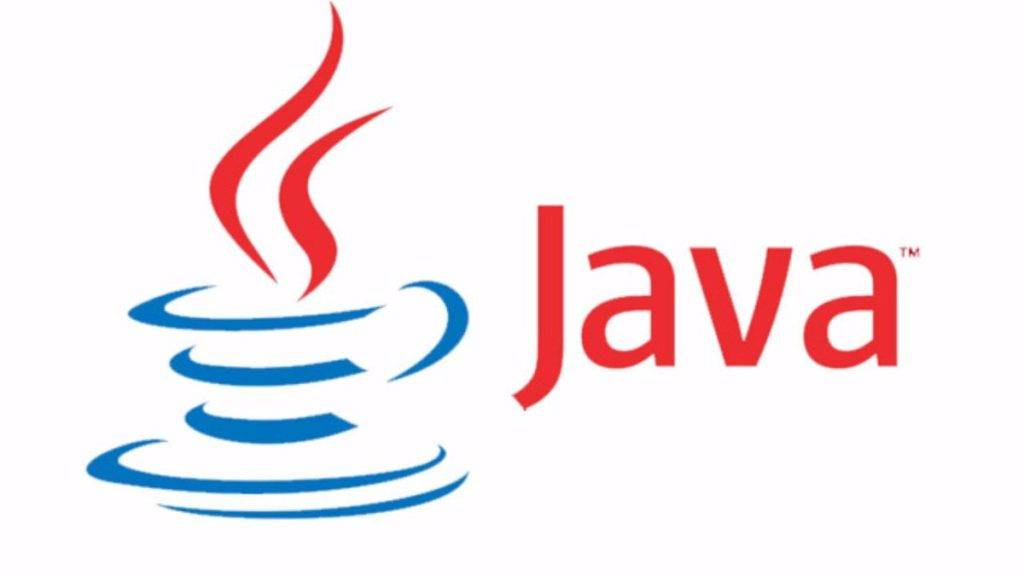
Currently, Java is widely used for backend and desktop applications development.
Java has excellent frameworks such as JavaFX to develop cross-platform desktop applications.
Spring is the most popular Java framework for developing backend services. Also, Spring provides some of the best libraries for microservice architecture.
Introduction to JavaScript
The first appearance of JS was in 1995. It’s a scripting language and it’s used to complete various tasks.
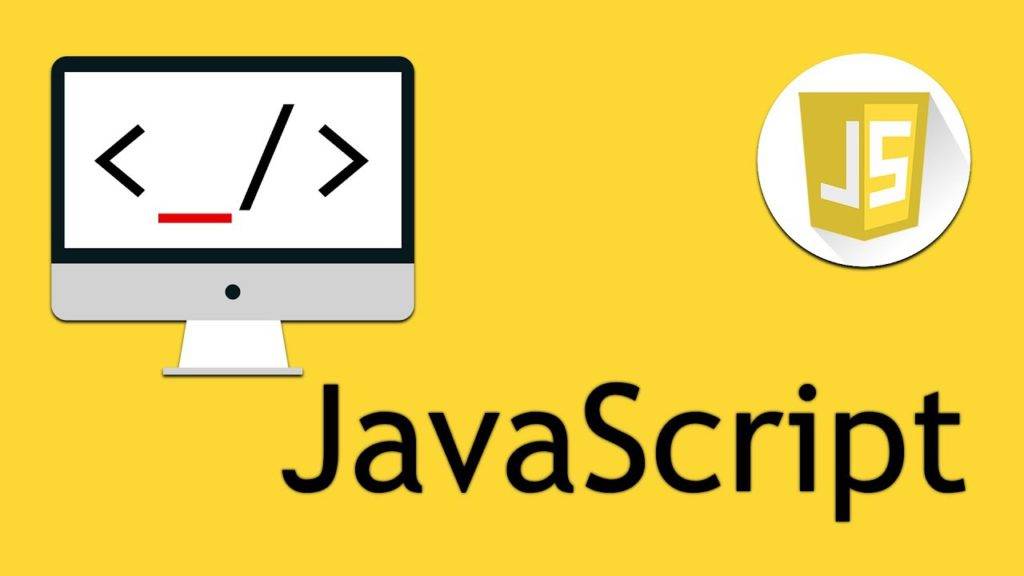
JS has famous frameworks and libraries such as ReactJS, Angular, NodeJS and ReactNative.
ReactNative is used to write mobile applications – both for Android and IOS.
Angular, ReactJS and VueJS are for writing frontend applications. Google supports Angular while Facebook supports ReactJS. As you can see, these JS libraries backed up by great technology companies.
NodeJS is used to write backend services.
Which is Popular: Java vs JavaScript
To understand the popularity of these languages, let’s take a look at numbers. I searched on GitHub and found out that there are 19,055,291 public repositories in total. 4,777,653 are JS and 3,336,873 are Java.
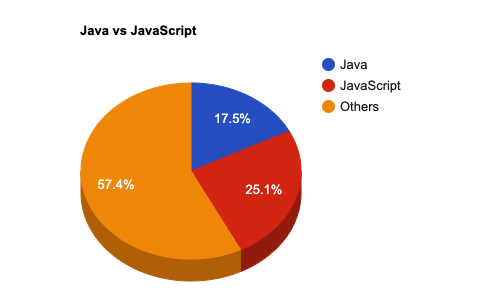
So, JS makes 25.1% of the public repositories in GitHub, and Java makes 17.5%. JS is the clear winner when it comes to the number of projects. It has 1.4 million more projects.
Well, the next step is to understand how many developers are there who knows each language. Again, GitHub is here to help us. There are 3,678,293 Java developers and 4,419,246 JS Developers.
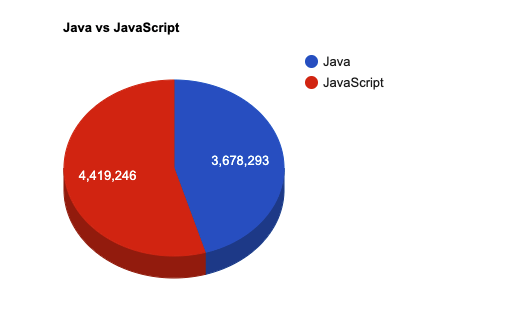
Again, there are more JavaScript developers than Java. But, this doesn’t mean that you shouldn’t consider Java for your projects. In a moment, I’ll explain why it makes sense to use Java in complex projects.
This numbers might slightly differ if you search in Github now, but I keep updating them every 2 months so that they will be as accurate as possible.
What Tasks Can Each of Them Complete: Java vs JavaScript
Both languages can complete similar tasks. Some tasks could be done well in one language, and others by the other one.
Let’s now look on each kind of software you might need to develop, and which language would be the right option.
Desktop Applications: Java vs JavaScript
JS has libraries such as Electron to write code for a desktop application. But, I’d not recommend using it. Because it will utilize more memory and CPU and might lack some features.

On the other hand, Java has well-known libraries such as JavaFX which can perform quite well. JavaFX is a Java software platform to develop desktop applications.
Even a poorly designed JavaFX project will outperform a well-designed Electron project. It will utilize memory better, and work faster.
So, when it comes to desktop applications, Java is the clear winner.
Mobile Applications
When it comes to developing a mobile application, JS is the preferred option. With React Native JS library it is easy to develop hybrid mobile apps. Hybrid apps work on both Android and IOS systems. So, you can use the same codebase for both OS.

Before, Java was used to develop native android apps, but it’s not common nowadays. Currently, Kotlin is used to develop native android apps and Swift for native IOS apps.
To conclude, JS is the winner because you Java is not an option to write mobile apps nowadays.
Web Applications (Backend and Frontend)

And, last but not least, let’s look at web applications development. Most of the web applications consist of two modules: backend and frontend.
Backend services are also used by mobile and desktop applications when data synchronization is needed.
So, when it comes to frontend application development, JS is the winner. ReactJS and Angular are perfect frameworks to develop frontend applications.
Although Java has some frameworks such as JSF to develop frontend projects, JS frameworks will outperform them with performance and speed. So, JS is the default option to develop the frontend applications.
Well, now it’s time to talk about developing backend services. Which language is a good option to develop backend services? This is a controversial issue and many things depend on the project and situation.
If you need a small-sized project, then NodeJS could work out. However, for large and complex projects Java is the right choice. It has well-established and tested libraries, and also could support a high load.
Even, small-sized backend services are ok to develop with Java, and if you feel comfortable with Java, then go ahead with it. However, keep in mind, that for large enterprise projects Java might be the right option.
For backend services, I’d recommend that you keep your core components and modules in Java and use NodeJS for small-sized services.
To summarize, JS is the preferable option for frontend projects. Both languages are good for backend tasks depending on the project size and requirements. And, you can take advantage of both of them, and in some projects use them together.
The Perfect Harmony: Java and JavaScript
We discussed these two languages and added some strong arguments which language to choose for a particular type of project. But, let me tell you a secret. Actually, the perfect marriage of these two makes the software industry powerful. It would be difficult to imagine the software industry without these two languages.
When developing software, don’t stick on one language. Make sure to use both of them, experiment, understand what works better for your project.
Now, many projects have desktop, mobile and web options, so you can use these both languages together to make your software perfect.
How to choose the right language for your next project
As we discussed desktop, mobile, frontend and backend projects before, let’s simplify and write it down which language to use for each case.
- Desktop Applications – Java
- Mobile – JS with React Native library unless you don’t want to build native mobile applications
- Frontend – JS with its rich frameworks: ReactJS, Angular, VueJS, etc
- Backend – Both could be used depending on the project. Large projects – Java. Small-sized projects, it’s ok to use any of them.
So, above, I mentioned which language suits best for a particular type of project. But there are other factors which you may take into consideration when selecting a language.
For example, which language your developers know better. Might be your team knows better Java than JS, and it makes sense to develop some frontend stuff with Java to finish it on time.
Another factor is the budget to consider. Each developer paid differently.
So, you don’t want to ruin your project budget, and also want to estimate the possible payroll for delivering and supporting the project.
Salary: Java vs JavaScript
Now you know how Java and JavaScript could be used together to make complex software. But we missed an important point. How much salary gets each developer. Is Java or JavaScript developer paid more?
Usually, Java and JS developers get similar salaries and the hourly rate for each language is in a similar range.
The pay for each developer depends on various factors such as experience or the country developers live.
To hire a Java or JS developer in the US, consider paying annually $85000 – $170000. As you can understand, the range is quite big, but paying more you will probably get better quality. The hourly rate would be approximately $50 – $100.
In Western Europe, the pay for each developer would be around $50000 – $100000 depending on experience and country. The developer salary is lower in Europe because the cost of living is relatively low compare to the US. The hourly rate would be $35 – $70.
In Eastern Europe, you will probably be able to find developers with annual salary $30000 – $45000. Hourly rate would be $20 – $40, and sometimes higher.
Last but not least, in Asia, developers are usually cheaper than in any part of the world. You can find developers starting from $8 up to $25 in these countries. But, keep in mind, if you pay less, you will probably get poor quality.
So, here is the salary graph.
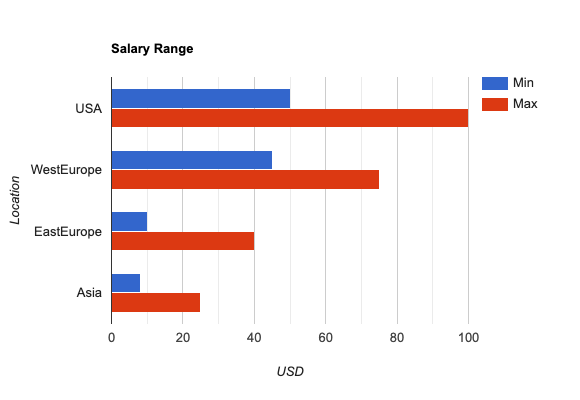
Learning Curve: Java vs JavaScript
So, now you have an idea, how much salary these developers get. You might thinking of learning any of these languages. Now, let’s understand which language is easier to learn, and if you know one of them, would it be easy to learn the another one.
Let’s take a typical scenario. You want to learn Java to develop backend applications or JS to develop frontend applications, and sometimes do some tasks with NodeJS on the backend side.
So, which language is easier to learn for starters who don’t know any programming languages. The straightforward answer is that JS is easier to learn.
Java has a sharp learning curve, while JS has a slightly smooth one.
To start developing projects with Java, you should have a good understanding of relational databases, SQL, non-relational databases, such as MongoDB, queues and you also should have a good knowledge of Java. Many stuff happens on the backend side, and that’s why it might take more time.
With JS, you can start developing frontend applications much easier. You don’t need to know relational databases and other complex technologies to start developing end-to-end projects with JS. However, you will need some stuff to understand, such as APIs, cookies and HTML/CSS. But learning this stuff is easier than backend stuff.
So, if you are a beginner, keep in mind that to master any of these languages might take you several years. Sometimes, I see some people claim they can help others to master Java or JS in 3 or 6 months. Don’t believe them, they are not telling you the truth.
Anyhow, you can learn the basics and try to find a new job where you can master your skills. So, 6 months would be enough to learn the basics and apply for junior or intern positions. Keep in mind, you will need to put lots of efforts during your learning. 8+ hours a day.
Learning JavaScript When You Know Java
I worked with Java several years. But jumping from Java to JS might not be as simple as it seems. I took 3-4 months to understand how frontend applications are developed so that I can develop them myself.
Concepts are a bit different in JS. And you will need to put these new concepts into action with new frameworks and libraries which you are not familiar with.
So, if you are an experienced Java developer and thinking of learning JS, I’d the advice to start with Angular. It has lots of similarities with Java, and might be easier to learn for you than ReactJS or VueJS.
If you are experienced in Java and have little experience with JS then it will take you 2-6 months to master a new JS library.
Learning Java When You Know JavaScript
Well, it might be a bit difficult to learn Java when you know JavaScript. Again, this is because of before mentioned reasons. To write end-to-end Java backend applications you will need to know other technologies SQL, queues, etc.
Anyhow, if you’re experienced in JS or any other programming language, then mastering a new one shouldn’t be a big challenge. So, consider 4-8 months to master Java with related technologies.
Final Thoughts About Learning Any of These Languages
So, if you’re a complete beginner, then JS seems an attractive option. Because you will learn it easier and probably faster. This will help you to land a new job faster.
But, if you are more on exploring backend, and doing stuff on backend, then try Java. There is more stuff, and Java is a good option to write large backend applications.
If you’re still here, it means you enjoy reading this article. So, subscribe to our email list. I’ll not spam you and will send you only weekly updates about hottest technologies and tools for software development.
Also, follow us on Linkedin, Instagram, Twitter and Facebook.
Genuine Blog and true.